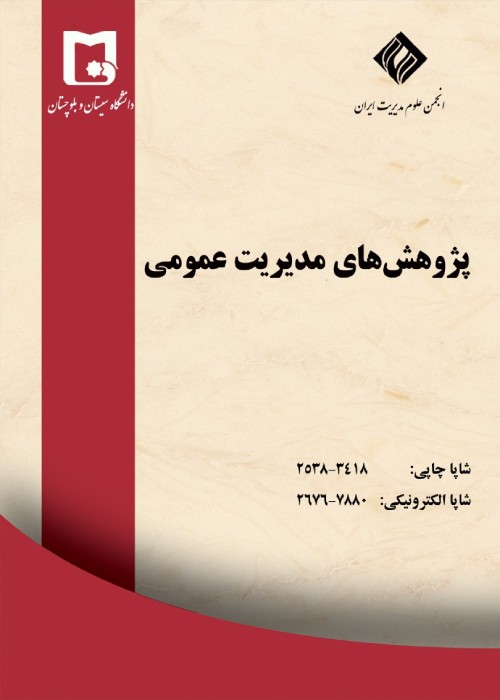Policy Making in the Field of Administrative Integrity System
Author(s):
Article Type:
Research/Original Article (دارای رتبه معتبر)
Abstract:
The ideals of democracy and good governance cannot be achieved without a safe and healthy environment. Administrative integrity system is an important factor to create a safe environment for public services delivery.This artical mainly aims to identify public policy formation model in administrative integrity system(Iran) .Here, so that the research strategy was quantitative at 3 steps at the first step, after recognition of a set of public policy formation indicators in administrative integrity system based on the research literature, history and experiences of other countries, the identified elements were screened over three rounds using the Delphi technique. The experts in first step were the faculty members with executive experience and graduated by Ph.D. in public administration. Also, the questionnaire was used for data collection in this step while confirmatory factor analysis was used for clustering the elements and the measurement model was evaluated by partial least squares technique and the software Smart PLS.
At next step, Analytical Hierarchy Process (AHP) was used to determine weight of criteria and the model indicators. The experts in this step included chief executives in Iranian Supreme Audit Court including the deputies and managers.at next step using the software MATLAB, sound policy formation was modeled in administrative integrity system. The results indicate that the most important components for successful policy making in administrative integrity system include infrastructures and capacity of the groups involved in the policy making. Also, 33 components of the study were finally approved by the experts
Introduction Democracy and Good governance objectives would be fulfilled in a safe and sound environment. Administrative integrity system is a precondition for good governance which is a prerequisite for citizens trust in public sphere (Lewis and Gilman, 2005). Therefore, the main objective of this study is determining an appropriate model for policy formation in administrative integrity system which is related to the new and modern policy making.
Research Methodology The current studys research methodology regarding its objective is exploratory, regarding the addressee is basic and regarding the methods of data collection is survey research. In this study Delphi technique was 21 PhD faculty members in the field of public administration of which 91% had administrative records. 14.2% were full professors, 14.2 % were associate professors and 71.4% were assistant professors. It is noteworthy that for assuring of the efficiency of the model in public organizations, 15 members of the Supreme Audit Court of Iran were attended in this study for ranking and determining dimensions and factors priorities. They had at least 15 years work experiences in the Supreme Audit Court of Iran and they had key positions (Deputy, director general) at least for five years. For providing the questionnaire used in this study the following researches were used (Harmon, 1998; Cuadrado, R. C. and Arce, J. L. A., 2005; Pope, J, 2000; OKeefe, 2000; Eigen, P, 1998; Atwood, 1998; Jayawickrama, 2001; Hill Michael and Peter Hupe , 2002; Hoogwod and Gun, 1984; Sabatier and Mazmanian, 1980; schimmelpfennig, 2002; Finnemore and Sikkink, 1998; Cortel and Davis, 2000; Schnell, 2014; Baumgartner, F. R., and Jones, 2009; Pressman and Wildavsky, 1974; Brinkerhoff, D. W., and Crosby, B., 2002; Baumgartner, F. R., and Jones, 2009; Kingdon, 2003; Berlinder; Baron and Gilardy, 2006; Rose, 2005) and content validity, Divergent and Convergent validity were used for confirming the validity of measuring tools and for measuring content-related validity a questionnaire was given to the supervisors and advisors and after considering their opinions and using the literature and research reviews, the questionnaires were edited and distributed. Convergent validity was studied using PLS software in two levels, factor (latent variable) and reference (questions or obvious variable). 24 questions were omitted due to having factor loading less than 4% and not having appropriate convergent validity. For evaluating convergent validity in latent variable level, after omitting the questions with low factor loading, average and variance were determined for the research variables that the results of AVE analysis show the existence of convergent validity for research structures. For evaluating index reliability two criteria of Cronbach's alpha and composite reliability was used. In each round Delphi, indices which had average lower than 3, were omitted of the model. in second step, in finalized questionnaire, paired comparisons (according to Saaty 9 grade spectrum), we have used the final questionnaire with Triangular fuzzy numbers of Lee and etal (2008, 101). in the third step, upon assistance of modeling experts, of appropriate formation of policy in the area of administrative integrity system extracted from the final dimensions ad factors in two previous levels was collected in the said spectrums, the questionnaire spectrum in this step has been collected considering one outcome I.e. policy formation (Effective, Relatively Effective and not Effective) and four entrances: 1- roles of external changes (Strong, Average, Weak), 2- structural institutional Capacity (Enough and developing, not enough and developing and not enough and not developing), 3- policy features (Clear, relatively clear and vague), 4- internal substructures (Strong, Average, Weak).
Findings In this study 33 factors for 7 dimensions of policy formation concept in administrative integrity system were identified. Kendall coefficient in the third round of Delphi technique was 0.609 that shows there are consensus among the experts opinions. For assuring of the correct clustering of the factors, structural equations and PLS Software were used. Of course with Confirmatory Factor Analysis and the second phase Confirmatory Factor Analysis was used for evaluation of relationship between main dimensions and the main concept i. e. administrative integrity system. Goodness of Fit Index (GFI) in this study is 0.632, therefore, the model has desirable fit. Also there was significant difference between dimensions of policy formation in the area of administrative integrity system from the experts point of view. Inconsistency rate of the performed comparisons was 0.023 which are smaller than 0.1, therefore, the comparisons are reliable and substructure dimension with weight of 0.259 has the most importance and the dimension of groups involved in policy is in the second priority.
Discussion and Results Considering the results of Delphi technique, substructures are of effective dimensions on policy formation in administrative integrity system and with the weight of 0.259 has the most importance from the experts point of view. The achieved results are consistent with the findings of (Kafman, 2003; Doig, A. and Riley, 1998; Glisp and Akralic, 1996; Doig, A. and Riley, 1998; Eigen, P., 1998; Aras, 2003; Hassan, 2004; Lorenzo Jr., H. C, 2000; Habtemichael, Faniel Sahle, 2009; Billy, 2000; Maro, 1995; and Fox, 1994). In the next step of modeling of appropriate formation of policy in the area of administrative integrity system, the subject was provided using software and the final results of modeling using software are consistent with Harmon (1968) findings about policy formation network.
At next step, Analytical Hierarchy Process (AHP) was used to determine weight of criteria and the model indicators. The experts in this step included chief executives in Iranian Supreme Audit Court including the deputies and managers.at next step using the software MATLAB, sound policy formation was modeled in administrative integrity system. The results indicate that the most important components for successful policy making in administrative integrity system include infrastructures and capacity of the groups involved in the policy making. Also, 33 components of the study were finally approved by the experts
Introduction Democracy and Good governance objectives would be fulfilled in a safe and sound environment. Administrative integrity system is a precondition for good governance which is a prerequisite for citizens trust in public sphere (Lewis and Gilman, 2005). Therefore, the main objective of this study is determining an appropriate model for policy formation in administrative integrity system which is related to the new and modern policy making.
Research Methodology The current studys research methodology regarding its objective is exploratory, regarding the addressee is basic and regarding the methods of data collection is survey research. In this study Delphi technique was 21 PhD faculty members in the field of public administration of which 91% had administrative records. 14.2% were full professors, 14.2 % were associate professors and 71.4% were assistant professors. It is noteworthy that for assuring of the efficiency of the model in public organizations, 15 members of the Supreme Audit Court of Iran were attended in this study for ranking and determining dimensions and factors priorities. They had at least 15 years work experiences in the Supreme Audit Court of Iran and they had key positions (Deputy, director general) at least for five years. For providing the questionnaire used in this study the following researches were used (Harmon, 1998; Cuadrado, R. C. and Arce, J. L. A., 2005; Pope, J, 2000; OKeefe, 2000; Eigen, P, 1998; Atwood, 1998; Jayawickrama, 2001; Hill Michael and Peter Hupe , 2002; Hoogwod and Gun, 1984; Sabatier and Mazmanian, 1980; schimmelpfennig, 2002; Finnemore and Sikkink, 1998; Cortel and Davis, 2000; Schnell, 2014; Baumgartner, F. R., and Jones, 2009; Pressman and Wildavsky, 1974; Brinkerhoff, D. W., and Crosby, B., 2002; Baumgartner, F. R., and Jones, 2009; Kingdon, 2003; Berlinder; Baron and Gilardy, 2006; Rose, 2005) and content validity, Divergent and Convergent validity were used for confirming the validity of measuring tools and for measuring content-related validity a questionnaire was given to the supervisors and advisors and after considering their opinions and using the literature and research reviews, the questionnaires were edited and distributed. Convergent validity was studied using PLS software in two levels, factor (latent variable) and reference (questions or obvious variable). 24 questions were omitted due to having factor loading less than 4% and not having appropriate convergent validity. For evaluating convergent validity in latent variable level, after omitting the questions with low factor loading, average and variance were determined for the research variables that the results of AVE analysis show the existence of convergent validity for research structures. For evaluating index reliability two criteria of Cronbach's alpha and composite reliability was used. In each round Delphi, indices which had average lower than 3, were omitted of the model. in second step, in finalized questionnaire, paired comparisons (according to Saaty 9 grade spectrum), we have used the final questionnaire with Triangular fuzzy numbers of Lee and etal (2008, 101). in the third step, upon assistance of modeling experts, of appropriate formation of policy in the area of administrative integrity system extracted from the final dimensions ad factors in two previous levels was collected in the said spectrums, the questionnaire spectrum in this step has been collected considering one outcome I.e. policy formation (Effective, Relatively Effective and not Effective) and four entrances: 1- roles of external changes (Strong, Average, Weak), 2- structural institutional Capacity (Enough and developing, not enough and developing and not enough and not developing), 3- policy features (Clear, relatively clear and vague), 4- internal substructures (Strong, Average, Weak).
Findings In this study 33 factors for 7 dimensions of policy formation concept in administrative integrity system were identified. Kendall coefficient in the third round of Delphi technique was 0.609 that shows there are consensus among the experts opinions. For assuring of the correct clustering of the factors, structural equations and PLS Software were used. Of course with Confirmatory Factor Analysis and the second phase Confirmatory Factor Analysis was used for evaluation of relationship between main dimensions and the main concept i. e. administrative integrity system. Goodness of Fit Index (GFI) in this study is 0.632, therefore, the model has desirable fit. Also there was significant difference between dimensions of policy formation in the area of administrative integrity system from the experts point of view. Inconsistency rate of the performed comparisons was 0.023 which are smaller than 0.1, therefore, the comparisons are reliable and substructure dimension with weight of 0.259 has the most importance and the dimension of groups involved in policy is in the second priority.
Discussion and Results Considering the results of Delphi technique, substructures are of effective dimensions on policy formation in administrative integrity system and with the weight of 0.259 has the most importance from the experts point of view. The achieved results are consistent with the findings of (Kafman, 2003; Doig, A. and Riley, 1998; Glisp and Akralic, 1996; Doig, A. and Riley, 1998; Eigen, P., 1998; Aras, 2003; Hassan, 2004; Lorenzo Jr., H. C, 2000; Habtemichael, Faniel Sahle, 2009; Billy, 2000; Maro, 1995; and Fox, 1994). In the next step of modeling of appropriate formation of policy in the area of administrative integrity system, the subject was provided using software and the final results of modeling using software are consistent with Harmon (1968) findings about policy formation network.
Keywords:
Language:
Persian
Published:
Management Researches, Volume:10 Issue: 38, 2018
Pages:
5 to 34
magiran.com/p1807135
دانلود و مطالعه متن این مقاله با یکی از روشهای زیر امکان پذیر است:
اشتراک شخصی
با عضویت و پرداخت آنلاین حق اشتراک یکساله به مبلغ 1,390,000ريال میتوانید 70 عنوان مطلب دانلود کنید!
اشتراک سازمانی
به کتابخانه دانشگاه یا محل کار خود پیشنهاد کنید تا اشتراک سازمانی این پایگاه را برای دسترسی نامحدود همه کاربران به متن مطالب تهیه نمایند!
توجه!
- حق عضویت دریافتی صرف حمایت از نشریات عضو و نگهداری، تکمیل و توسعه مگیران میشود.
- پرداخت حق اشتراک و دانلود مقالات اجازه بازنشر آن در سایر رسانههای چاپی و دیجیتال را به کاربر نمیدهد.
In order to view content subscription is required
Personal subscription
Subscribe magiran.com for 70 € euros via PayPal and download 70 articles during a year.
Organization subscription
Please contact us to subscribe your university or library for unlimited access!




